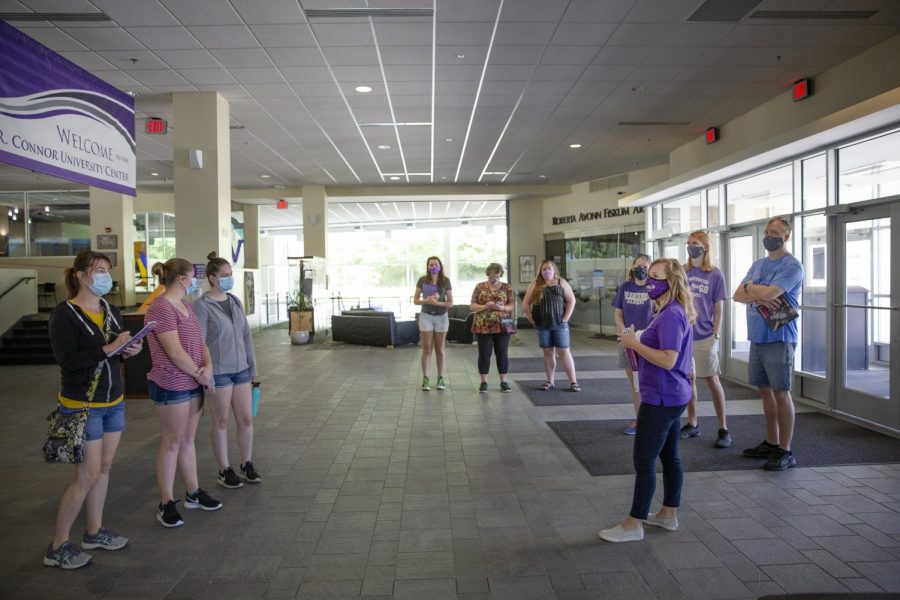Community Engagement Center Faculty Lead Gender Inclusivity Workshop
UW-Whitewater Photo/ Craig Schreiner
Jackie Briggs, front right in purple, Director of Admissions, leads a tour in the University Center lobby. UW-Whitewater admissions staff visited with incoming and prospective students and their families and guided small tour groups around campus on Thursday, July 16, 2020.
September 6, 2020
On August 28 University of Wisconsin-Whitewater staff held a virtual workshop focused on educating participants about the discrimination LGBTQ individuals face in the healthcare industry and the importance of the correct use of pronouns and their origins.
The workshop was led by Stephanie Selvick, LGBT coordinator for UW-Whitewater. The main focus of the meeting was to educate local healthcare professionals but, it was open to anyone that wanted to listen in. Selvick used the hour she had to debunk myths and other stigma surrounding LGBTQ folks in regards to healthcare. Discrimination such as not having trans or other gender options on hospital forms and healthcare professionals refusing to see trans or other LGBTQ patients.
One of the main points Selvick made during the workshop was that transgender teens and young trans adults are being targeted for violence at alarming rates. In a study done by the Human Rights Campaign (HRC) in 2018, they found that out of 12,000 youths, ages between 13-17, 42 percent of those surveyed said they had experienced physical threats because of their gender identity. What that means is, since LGBTQ people are targets of threats or violence at such a high rate, it is crucial that they have access to medical care and medical professionals who won’t discriminate based on gender identity or sexual orientation.
Selvick also discussed the suicide rates of the LGBTQ community and pointed out that they are much higher than that of heterosexuals. However, in another study that Selvick alluded to, it showed that if there was a Gay-Straight Alliance (GSA) organization at schools, it decreased suicide rates of everyone, regardless of sexuality or gender identity.
“Schools that simply had a Gay-Straight Alliance at their school for three years or more, suicide attempts that students had halved in schools that had GSA’s. So, simply having a Gay-Straight Alliance reduced suicide risk in half for all students, including heterosexual boys,” Selvick said.
On the subject of pronouns, the presentation showed the proper pronouns for each gender identity that are widely accepted and used by the LGBTQ community. Some frustration has accrued over the years due to people not using proper pronouns when referring to trans individuals or people that identify as other genders.
“I think it’s annoying that people think it’s so hard to call people what they want to be called. It’s a person’s individual preference. If someone makes it clear that they want to be referred to by a certain pronoun, then just be respectful and use that pronoun,” said Josie Cruz, a senior psychology major at UW-Whitewater.
The workshop wrapped up with some thoughts about what the next steps are and what students and professionals across industries can do to help level the playing field in regards to the LGBTQ community.
The Royal Purple also reached out to Jai Becker, a UW-Whitewater alumnus who identifies as a homosexual cisgender male. When prompted about the current status of the LGBTQ community both nationwide and globally and what changes he wanted to see, he had this to say: “I think that our education system could be doing a lot more teaching about LGBTQ history and what’s been going on. A lot of the stuff that I’ve learned has been self-taught through research and friends,” “I believe that we are making progress as a community for acceptance but, I don’t think that progress is happening fast enough.”













